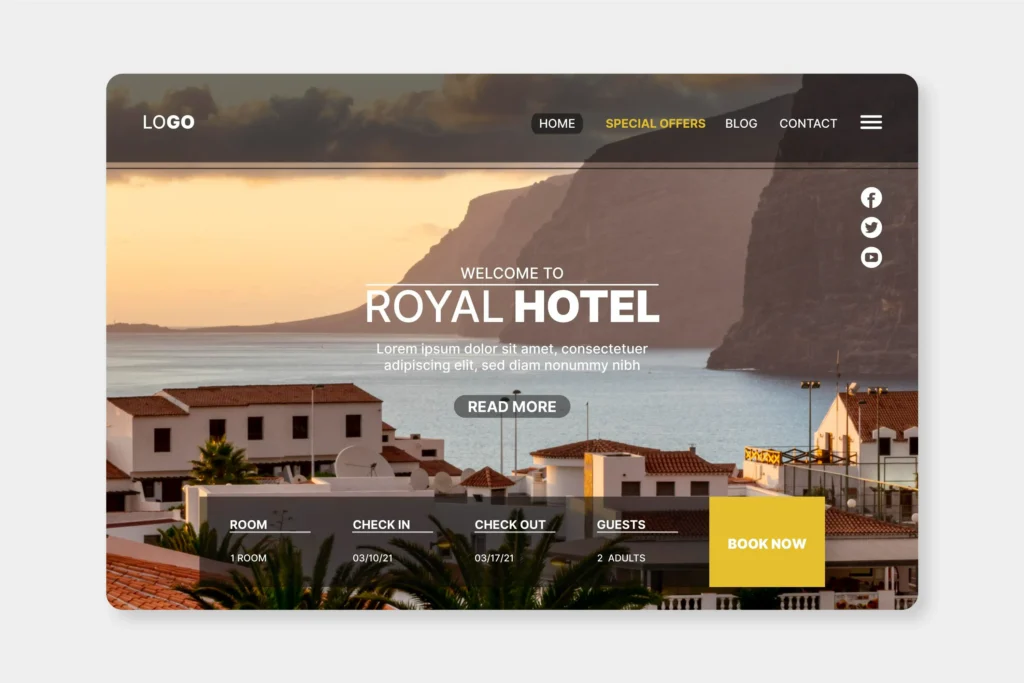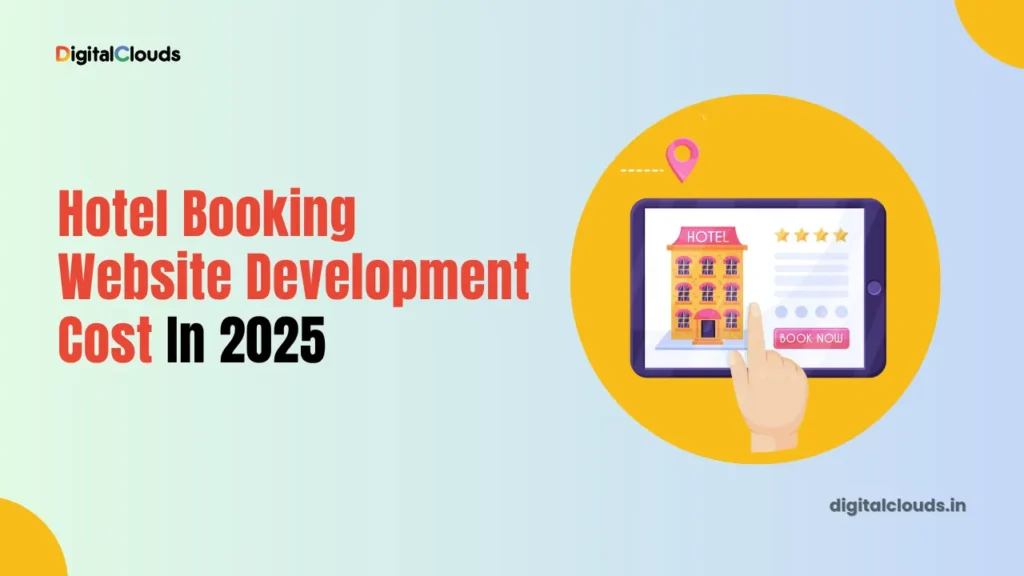Creating a strong online presence has become essential for every hotel and travel business today. Before you get started, it’s important to understand the real Hotel Booking Website Development Cost so you can budget properly and avoid surprises later.
Whether you’re a small hotel owner wanting to attract more direct bookings or an entrepreneur planning to launch a large platform similar to Booking.com, understanding the true Hotel Booking Website Development Costs is a crucial first step. These costs aren’t just about paying for design or coding; they involve everything from advanced booking systems and secure payment gateways to mobile optimization, multilingual support, and long-term maintenance.
In this blog, we’ll break down all the important factors that influence the Hotel Booking Website Development Cost in 2025. By the end, you’ll have a clear idea of what it takes to bring your vision to life and how to plan your budget wisely. Let’s dive in!
What is the Purpose of Hotel Booking Website Development?

In today’s digital age, having a hotel booking website is not just an option — it is a powerful necessity. A professionally crafted booking website helps you connect directly with your guests, strengthen your brand identity, boost bookings, and improve overall business efficiency while offering a seamless online experience to travelers.
- Attract More Guests Globally: A website opens your property to a worldwide audience, allowing travelers from anywhere to discover, explore, and book your rooms with ease.
- Provide Convenient 24/7 Booking: Guests can check availability, compare room types, and make reservations anytime, day or night, without the need for manual communication.
- Enhance Brand Credibility and Trust: A modern, professional website showcases your brand’s personality, builds trust, and sets your hotel apart from competitors.
- Simplify Reservation and Payment Processes: Integrated booking engines and secure payment gateways make it easy for guests to book and pay online instantly, reducing operational errors and manual work.
- Gather Valuable Data and Insights: Collect and analyze guest data, booking patterns, and preferences to optimize marketing strategies, personalize offers, and increase guest loyalty.
- Strengthen Direct Booking Channels: Reduce reliance on third-party platforms and avoid paying high commission fees by encouraging more direct bookings through your own website.
- Promote Special Offers and Packages: Highlight exclusive discounts, seasonal deals, and customized packages directly to your guests, which can increase conversions and revenue.
- Improve Guest Communication and Engagement: Share updates, answer common questions, and provide important information like check-in times or local attractions to improve guest satisfaction.
What to Consider When Creating a Hotel Booking Website?
Developing a hotel booking website is a strategic investment that requires careful thought, planning, and expert execution. To ensure your website delivers value, stands out, and supports your long-term growth, it’s essential to understand and evaluate these important considerations.
- Type and Scale of the Website: Decide whether you need a simple showcase website for one property or a robust booking platform for multiple locations and hundreds of rooms. This affects cost and timeline significantly.
- Design Complexity and User Experience: Prioritize a user-friendly, visually appealing, and responsive design that works flawlessly across devices. A smooth, intuitive experience can greatly increase booking conversions.
- Integration of Booking and Payment Systems: Advanced booking engines, real-time availability, dynamic pricing, secure payment gateways, and instant confirmation emails are crucial for smooth transactions and trust.
- Multi-language and Multi-currency Support: Cater to a global audience by offering content in multiple languages and accepting various currencies. This enhances accessibility and increases bookings from international travelers.
- SEO and Digital Marketing Readiness: Ensure your website is optimized for search engines and supports marketing tools like blogs, social media integration, and remarketing features to drive organic traffic and grow visibility.
- Content Management Flexibility: Choose a system that allows you to easily update room rates, availability, images, promotions, and policies without relying on developers each time.
- Developer Expertise and Maintenance Needs: Partnering with experienced developers ensures robust security, better performance, scalability, and reliable post-launch support. Regular maintenance is essential for security updates and feature enhancements.
- Mobile Optimization: With most travelers browsing and booking on their smartphones, a mobile-optimized or fully responsive design is no longer optional — it’s critical.
- Advanced Features and Custom Add-ons: Consider including loyalty programs, virtual room tours, guest review modules, AI-based recommendations, and integration with third-party services for enhanced user experience.
- Compliance and Data Security: Make sure your website complies with data privacy laws like GDPR and includes secure data handling practices to protect guest information and maintain trust.
Key Components Required for Successful Hotel Booking Website Development
When creating a hotel booking website in 2025, it’s critical to include the right foundational components to ensure your platform is modern, reliable, and capable of turning visitors into confirmed guests. Here’s a detailed look at the core elements you need for success:
Domain Name
Your domain name is your hotel’s online identity and a crucial part of your brand strategy. It should be short, memorable, and clearly linked to your hotel name or location. A strong domain improves credibility and makes it easier for guests to find and remember your website, ultimately driving more direct traffic and bookings.
Web Hosting
Reliable and secure web hosting ensures your website loads quickly and remains accessible at all times. With more travelers booking rooms online, performance and uptime are critical. High-quality hosting solutions can handle large volumes of traffic, protect against security threats, and provide scalable resources as your business grows.
Content Management System (CMS)
A robust CMS makes it easier to manage and update your hotel website without requiring advanced technical skills. Popular options include:
- WordPress: One of the most widely used platforms, known for its flexibility, ease of use, and extensive plugin ecosystem tailored for hotel booking functionalities.
- Joomla: Another powerful CMS with strong customization options, suitable for hotels looking for more control and advanced features.
- Custom CMS Solutions: For hotels with unique requirements or highly customized workflows, a tailor-made CMS can offer full control over design and functionality.
Using a CMS allows you to efficiently manage pages, update content, upload new images, publish offers, and handle bookings — all from a centralized, user-friendly dashboard.
- Also Read: WIX Website Development Cost in 2025
Website Design and Theme
Your website’s design should reflect your hotel’s brand identity and create an inviting, professional look that builds trust with potential guests. A modern, mobile-responsive, and visually engaging design helps convert visitors into bookings. Most CMS platforms offer pre-built themes designed specifically for hotels, which can include room showcase layouts, booking widgets, and call-to-action sections optimized for conversions.
Plugins and Integrations
Adding the right plugins or extensions enhances your website’s functionality and guest experience. Essential integrations include:
- Booking engine plugins: For real-time room availability and instant reservations.
- Payment gateways: To securely process payments from guests worldwide.
- CRM and email marketing tools: To build and maintain guest relationships.
- Multilingual support: To cater to international guests and increase global reach.
- SEO and analytics tools: To improve visibility and track website performance.
These integrations allow your website to operate as a complete online booking and marketing system.
Content and Media
High-quality visuals and compelling content are critical for attracting and engaging guests. Use professional photos and videos to showcase rooms, amenities, dining, wellness facilities, and local attractions. Virtual tours can further enhance the browsing experience. Well-written, informative content not only explains what makes your property unique but also improves your search engine rankings and drives more organic traffic.
Essential Website Features for Success
Your website must include core functionalities that simplify the booking journey and improve user experience, such as:
- Real-time room availability and dynamic pricing.
- Secure online booking and payment options.
- Guest reviews and testimonials to build trust.
- Special offers, packages, and loyalty program promotions.
- Advanced search and filtering capabilities.
- Multi-language and multi-currency support to cater to diverse markets.
- Personalized recommendations and upselling opportunities.
Ongoing Maintenance and Robust Security
Maintaining and protecting your hotel booking website is an ongoing responsibility. This includes:
- Regularly updating your CMS, themes, and plugins to ensure compatibility and security.
- Implementing SSL certificates, strong passwords, and firewall protection to safeguard guest data.
- Scheduling regular backups to avoid data loss in case of emergencies.
- Continuously monitoring website performance to ensure fast loading and smooth navigation.
Keeping your website secure and up to date helps maintain trust with your guests, supports SEO performance, and ensures a seamless booking experience at all times.
Key Factors Affecting Hotel Booking Website Development Costs
Understanding what drives the cost of a hotel booking website is essential for making smart, budget-friendly decisions. Multiple factors influence the final price, from technical needs to design complexity and future scalability. Here are the main elements to consider:
- Website Type and Feature Complexity: A simple website with basic information and a contact form is far cheaper than a fully functional booking platform with real-time availability, automated confirmations, guest reviews, loyalty programs, and integrated payment systems.
- Design and User Experience: Custom, high-end designs tailored to match your brand image cost more than standard templates. Investing in intuitive navigation, appealing visuals, and mobile responsiveness enhances guest satisfaction but increases development costs.
- Integration with External Systems: Connecting your website to property management systems (PMS), channel managers, CRM tools, and third-party travel platforms can raise the cost due to the additional work and ongoing maintenance.
- Multi-language and Multi-currency Support: Providing a seamless experience to international guests requires content translations and secure handling of different currencies, adding both development and operational expenses.
- Booking Engine and Payment Gateway Security: Implementing robust, PCI-compliant payment systems and secure booking engines to protect guest data involves higher development and testing costs.
- Content Creation and SEO Optimization: High-quality photos, videos, copywriting, and SEO-friendly content development are essential for online visibility and better guest engagement, but they add to the upfront investment.
- Developer or Agency Expertise: Hiring a skilled agency or experienced freelance developer typically costs more but ensures better scalability, reliability, and support after launch.
- Ongoing Maintenance and Updates: Post-launch costs such as bug fixes, feature upgrades, security patches, and technical support should also be included when planning your budget.
How Much Does Hotel Booking Website Development Cost in 2025?
A hotel booking website can cost anywhere from $2,000 to $40,000, and for large, enterprise-level solutions, the cost can go up to $90,000 or more in 2025. The final price depends on the scale of your project, the features you choose, and the complexity of design and integrations.
A basic informational website, which showcases your rooms, amenities, and contact details without booking functionality, generally costs between $2,000 and $5,000. This option works well for small hotels that want an online presence without advanced features.
A standard booking website, offering real-time room availability, secure online payments, and a mobile-friendly design, usually ranges from $7,000 to $15,000. It’s ideal for mid-sized hotels seeking direct online bookings.
A fully featured advanced platform, including dynamic pricing, loyalty programs, multi-property support, and integrations with property management systems, typically costs $20,000 to $40,000.
For larger hotel groups or platforms similar to Booking.com, an enterprise-level website can easily exceed $50,000, reaching up to $90,000 or more when including AI features, global payment systems, and advanced analytics.
Ultimately, your budget will also depend on whether you choose a custom design or a template-based approach. Working with an experienced developer ensures a user-friendly, revenue-generating website that elevates your brand.
Breakdown of Typical Hotel Booking Website Development Cost Ranges in 2025
While exact prices vary depending on requirements and complexity, having a general estimate helps in planning. Here’s an overview of what you can expect to pay for a hotel booking website in 2025:
| Type of Website | Estimated Cost Range | Key Features & Description |
|---|---|---|
| Basic Informational Website | $2,000 – $5,000 | Ideal for small hotels or guesthouses that need a simple online presence without booking functionalities. Includes basic pages, attractive design, photo galleries, and contact information. |
| Standard Booking Website | $7,000 – $15,000 | Includes core booking features, secure payment integration, responsive design, basic room and availability management. Suitable for medium-sized hotels looking to accept direct online bookings. |
| Advanced Booking Platform | $20,000 – $40,000 | Custom-built with advanced features like multi-property management, dynamic pricing, loyalty programs, integrations with PMS/CRM systems, and more customization options. Ideal for larger hotels or groups. |
| Enterprise-Level Solution | $50,000 – $90,000+ | Highly sophisticated, scalable platforms similar to Booking.com. Includes full automation, AI-powered recommendations, advanced analytics, multi-language and multi-currency support, global payment systems, and complex integrations. |
How to Design Your Hotel Booking Website
Designing a hotel booking website requires a careful focus on user experience and features that enhance the guest’s journey from browsing to booking. Here are some key considerations to keep in mind:
Availability Search
Your website should have a seamless search feature that allows guests to easily check room availability and book their stay directly through the site. This feature should be intuitive, quick, and user-friendly to encourage direct bookings.
Room Descriptions
Provide detailed descriptions of each room type, including size, key features, and available amenities. Adding high-quality photos helps guests visualize their stay and confidently choose the room that best matches their needs.
Hotel Location
Guests should be able to easily find your hotel’s location on the website. Integrating an interactive map with directions to your property and highlighting nearby attractions, restaurants, and landmarks can significantly improve the guest experience.
Amenities
Clearly list all the amenities your hotel offers, such as pools, restaurants, fitness centers, spas, and business facilities. This information helps guests make informed decisions and can set your property apart from the competition.
Special Offers
Highlight seasonal discounts, promotional packages, or exclusive deals directly on the website. Prominent placement of special offers can encourage faster bookings and attract repeat guests.
Online Payment Option
Incorporating secure online payment gateways allows guests to pay directly on your website, streamlining the booking process and increasing convenience and trust.
Review Portal
Allow guests to leave reviews directly on your website. Showcasing authentic feedback builds credibility, strengthens your online reputation, and encourages new guests to book with confidence.
360-Degree Videos
Adding 360-degree videos of your hotel’s interior and exterior offers a virtual tour experience. Guests can explore rooms, amenities, and common areas before booking, which enhances their confidence and excitement.
Room Availability Status
Ensure your website displays up-to-date room availability. Clearly indicating when rooms are booked and when they will become available helps guests plan their stays and reduces booking friction.
SEO Friendly
Optimize your website for search engines by using proper keywords, meta tags, alt text for images, and clean URLs. An SEO-friendly website ranks higher in search results, increasing your visibility and attracting more organic traffic.
Fast Loading Time
A fast-loading website is crucial for maintaining a positive user experience. Guests expect instant access to information, and a slow website can frustrate visitors and lead to abandoned bookings.
How Much Does Hotel Booking Website Maintenance Cost?
Hotel booking website maintenance is a necessary investment to ensure smooth performance, security, and guest satisfaction. The cost varies based on your website’s complexity, required features, and the service provider’s expertise. On average, hotels should set aside 2% to 5% of their total online revenue for ongoing maintenance. This covers regular updates, security patches, software upgrades, and content changes like promotions, pricing, or availability.
Websites with dynamic content, seasonal offers, or frequent updates naturally require more attention, which can raise costs. Conversely, simpler websites with minimal updates may incur lower maintenance fees. Whether managed in-house or outsourced, consistent upkeep is crucial to protect your website’s performance, reputation, and return on your hotel website development cost over time.
Should You Hire a Hotel Booking Website Development Company?
Whether you should hire a hotel booking website development company depends on your goals, budget, and technical skills. If you’re creating a new website or need a complete redesign, partnering with experts is a smart investment.
A professional team ensures a modern, user-friendly, and secure site that meets guest expectations and increases direct bookings. It also helps you avoid technical errors and saves valuable time. However, if you already have a functional site and only need minor updates, and you feel confident using website builders or content management systems, a DIY approach might work and reduce costs.
Ultimately, choosing professionals often delivers better long-term value and justifies your hotel website development cost by improving performance and guest satisfaction.
How Often Should You Update Your Hotel Booking Website?
When it comes to hotel website development, keeping your website fresh and up to date is crucial for staying competitive and maintaining guest trust. In general, it’s recommended to update your hotel booking website at least once a month. Regular updates ensure that your guests always see accurate information about room availability, rates, special offers, and local events.
Updating your website frequently also helps improve your search engine ranking, making it easier for new travelers to discover your property online. Fresh content signals to search engines that your site is active and relevant, which can ultimately increase organic traffic and direct bookings.
If you find it challenging to maintain monthly updates, consider partnering with a professional hotel website development company. These experts can handle ongoing updates, content refreshes, security improvements, and technical maintenance to keep your website running smoothly. Investing in regular updates not only improves user experience but also protects the value of your initial investment and helps justify your hotel website development cost over time.
Should You Build a Hotel Booking Website or Mobile App?
When deciding between building a hotel booking website or developing a mobile app, it’s important to evaluate your business goals, budget, and customer behavior. Both platforms offer unique benefits, and choosing the right one—or a combination of both—can significantly impact your hotel’s visibility and revenue.
A hotel booking website is essential for any property aiming to establish a strong online presence. Websites are easily accessible across all devices, especially desktops and tablets, and offer greater flexibility in design, functionality, and content management. You can optimize your website for SEO, monitor user behavior with tools like Google Analytics, and adjust your content to match seasonal promotions or customer preferences. Additionally, websites allow you to integrate with booking engines, chatbots, CRM systems, and review platforms—all of which enhance the customer experience.
On the other hand, a mobile app provides convenience and speed. Travelers today often rely on smartphones to make quick, last-minute bookings, and an app offers a seamless way to do just that. Apps can store user preferences, enable push notifications for promotions or discounts, and provide a personalized booking experience. They’re particularly effective if you’re targeting a younger, tech-savvy audience that values speed, convenience, and modern interfaces.
So, which one should you choose? If your primary goal is to reach a broader audience and improve your online discoverability, start with a website. However, if you’re aiming to increase customer retention and improve the experience for repeat guests, consider developing an app alongside your website. For many modern hotels, a responsive website combined with a mobile app is the ideal solution to cover all customer touchpoints.
How to Market Your Hotel Booking Website Effectively?
There are numerous effective strategies to market your hotel website and drive more bookings. One of the most popular methods is listing your property on online travel agencies (OTAs) such as Expedia, Orbitz, and Booking.com, which help you reach a wider audience actively searching for accommodations.
In addition to OTAs, investing in Google Ads can significantly boost visibility by placing your hotel in front of potential guests at the top of search engine results. However, to achieve long-term success, it’s essential to implement SEO services that optimize your website content, improve search rankings, and drive organic traffic.
Leveraging social media marketing services is another powerful way to connect with your audience. Platforms like Facebook and Instagram allow you to showcase your property, run targeted ads, and engage with travelers in real time. With Facebook marketing, you can promote special offers, highlight guest experiences, and attract more direct bookings. Meanwhile, YouTube Marketing lets you share virtual tours, promotional videos, and customer testimonials that build trust and interest.
Additionally, listing your hotel on travel directories such as TripAdvisor, Lonely Planet, and Google My Business boosts your online presence and credibility. By combining SEO services, Facebook marketing, YouTube Marketing, and other social media marketing services, you can create a well-rounded digital strategy that increases website traffic, enhances brand awareness, and ultimately boosts bookings.
Ultimate Tips to Reduce Hotel Booking Website Development Costs in 2025
Building a feature-rich, professional hotel booking website doesn’t have to break the bank. Here are some smart strategies to lower Hotel Booking Website Development Costs in 2025 without sacrificing quality:
- Define Your Core Features First: Focus on must-have features and avoid unnecessary add-ons during the initial phase. You can always add advanced functionalities later as your business grows.
- Use Pre-built Booking Engines: Instead of building a custom booking engine from scratch, use trusted third-party booking systems that can be integrated seamlessly and cost-effectively.
- Choose Scalable Templates: Start with customizable, responsive templates to reduce design costs while still achieving a professional look.
- Plan for Phased Development: Break your website launch into phases. Start with an MVP (minimum viable product) to test the market and gather feedback before investing in additional features.
- Negotiate with Developers or Agencies: Get quotes from multiple vendors and negotiate a package deal that includes essential services like maintenance and updates.
- Leverage Open-source Tools: Use open-source content management systems (CMS) and plugins wherever possible to reduce licensing fees.
- Prepare Content in Advance: Have your photos, copy, and other content ready to avoid delays and extra charges from developers waiting on materials.
- Invest in Proper Project Planning: A clear project scope, detailed requirement documentation, and realistic timelines help avoid costly scope creep and unexpected changes during development.
- Consider Hybrid or Offshore Teams: Hiring a mix of local and offshore developers can help balance quality and cost, provided you manage communication effectively.
Why Choose DigitalClouds Technologies for Hotel Booking Website Development?
At DigitalClouds, we specialize in crafting high-performance hotel booking websites that not only look great but also convert visitors into paying guests. As a globally recognized hotel marketing company, we bring years of experience in hospitality-focused web development and digital marketing.
Our team of expert web developers in India works closely with you to create a fully customized booking platform tailored to your hotel’s needs. Whether you’re running a boutique guesthouse, luxury resort, or chain of hotels, we can design a visually appealing, mobile-friendly, and conversion-optimized website that reflects your brand and supports your business goals.
But we don’t stop at development. We also offer comprehensive digital marketing services to promote your hotel online. From SEO and Google Ads to social media marketing and OTA optimization, we ensure your hotel reaches the right audience at the right time.
With DigitalClouds, you can:
- Get a user-friendly and secure hotel booking website.
- Integrate real-time availability, dynamic pricing, and booking engines.
- Ensure seamless browsing experiences on desktop and mobile.
- Attract more guests through professional marketing and SEO services.
- Increase direct bookings and reduce OTA commission costs.
Ready to grow your hotel business online? Explore our affordable website development packages and get in touch with us today to start your journey toward digital success.
FAQs About Hotel Booking Website Development Costs in 2025
Find clear, detailed answers to the most common questions about hotel booking website development costs in 2025, helping you understand what to expect, plan your budget wisely, and make confident decisions for your hotel business.
How long does it take to build a hotel booking website?
The time required to build a hotel booking website depends on the complexity of your design, the number of features, and customization needs. A simple website may take 4–6 weeks, while a fully customized, feature-rich platform can take anywhere from 3 to 6 months or even longer. Working with a professional hotel booking website development company helps ensure that the process stays on track, avoids delays, and delivers a polished, high-quality final product.
Can I integrate my PMS with a new hotel booking website?
Yes, integrating your Property Management System (PMS) with your hotel booking website is possible and highly beneficial. It allows automatic syncing of room availability, pricing, and reservations, significantly reducing manual errors and administrative workload. When calculating your hotel website development cost, be sure to include the expense of system integrations. This investment provides guests with real-time, seamless booking experiences and helps your operations run more smoothly and efficiently.
Does multi-language support affect hotel website development cost?
Adding multi-language support can increase hotel website development costs because it requires content translations, additional design adjustments, and careful testing to ensure a smooth user experience for every language. However, this feature can significantly improve your global reach and attract international guests who feel more comfortable browsing and booking in their own language. It’s a valuable investment for hotels aiming to grow their brand beyond local markets and boost direct bookings worldwide.
What security features should my booking website include?
A secure hotel booking website should include features like SSL certificates, PCI-compliant payment gateways, strong data encryption, firewalls, and regular security audits. These elements protect your guests’ personal and payment information, prevent cyberattacks, and help maintain a strong reputation. While prioritizing security might increase upfront costs, it is an essential investment to build trust with your guests, avoid legal issues, and ensure long-term success and reliability for your online booking system.
Can a professional website help reduce OTA commission fees?
Absolutely! A professionally developed hotel booking website encourages more direct bookings by offering an easy-to-use, visually appealing, and secure reservation experience. This helps reduce reliance on online travel agencies (OTAs), which often charge high commission fees for each booking. By driving more guests to book directly through your own website, you keep more revenue in-house, build stronger relationships with your guests, and increase profitability. Over time, this can result in substantial cost savings and brand loyalty.
Can I add new features later without major costs?
Yes! If your hotel booking website is built with scalability and flexibility in mind, you can easily add new features over time without major redevelopment costs. Examples include loyalty programs, virtual tours, advanced analytics, or integrations with marketing tools. Planning for growth from the start helps manage hotel website development cost more effectively. By adopting a phased development approach, you can introduce new functionalities as your business evolves, keeping your website competitive and engaging for guests.






